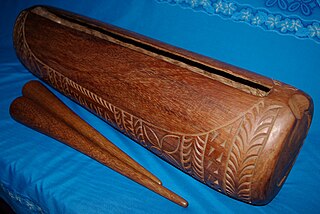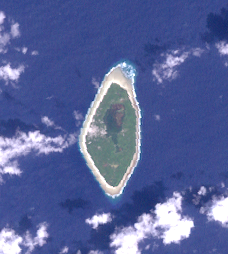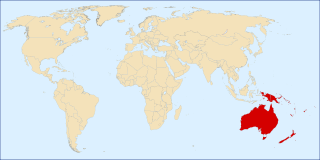Tokelau, Tuvalu is a village on the island of Nanumanga, Tuvalu. [1]
As of 2012, [update] Tokelau's population was 245. It is the larger of Nanumanga's two villages, the other being Tonga. [1]
Tokelau means "north-northeast" in Tuvaluan and some other Polynesian languages.
Tokelau has a tropical rainforest climate (Af) with heavy rainfall year-round.
| Climate data for Tokelau | |||||||||||||
|---|---|---|---|---|---|---|---|---|---|---|---|---|---|
| Month | Jan | Feb | Mar | Apr | May | Jun | Jul | Aug | Sep | Oct | Nov | Dec | Year |
| Average high °C (°F) | 31.4 (88.5) | 31.3 (88.3) | 31.3 (88.3) | 31.2 (88.2) | 31.2 (88.2) | 30.9 (87.6) | 30.6 (87.1) | 30.7 (87.3) | 31.1 (88.0) | 31.3 (88.3) | 31.5 (88.7) | 31.4 (88.5) | 31.2 (88.1) |
| Daily mean °C (°F) | 28.4 (83.1) | 28.3 (82.9) | 28.4 (83.1) | 28.3 (82.9) | 28.4 (83.1) | 28.2 (82.8) | 28.0 (82.4) | 28.0 (82.4) | 28.3 (82.9) | 28.4 (83.1) | 28.4 (83.1) | 28.4 (83.1) | 28.3 (82.9) |
| Average low °C (°F) | 25.4 (77.7) | 25.3 (77.5) | 25.5 (77.9) | 25.5 (77.9) | 25.7 (78.3) | 25.6 (78.1) | 25.5 (77.9) | 25.4 (77.7) | 25.5 (77.9) | 25.5 (77.9) | 25.4 (77.7) | 25.4 (77.7) | 25.5 (77.9) |
| Average precipitation mm (inches) | 330 (13.0) | 261 (10.3) | 313 (12.3) | 236 (9.3) | 192 (7.6) | 177 (7.0) | 196 (7.7) | 214 (8.4) | 175 (6.9) | 193 (7.6) | 216 (8.5) | 339 (13.3) | 2,842 (111.9) |
| Source: Climate-Data.org [2] | |||||||||||||

Tuvalu is an island country and microstate in the Polynesian subregion of Oceania in the Pacific Ocean. Its islands are situated about midway between Hawaii and Australia. They lie east-northeast of the Santa Cruz Islands, northeast of Vanuatu, southeast of Nauru, south of Kiribati, west of Tokelau, northwest of Samoa and Wallis and Futuna, and north of Fiji. Tuvalu is composed of three reef islands and six atolls. They are spread out between the latitude of 5° and 10° south and between the longitude of 176° and 180°. They lie west of the International Date Line. Tuvalu has a population of 11,204. The total land area of the islands of Tuvalu is 26 square kilometres (10 sq mi).

The first inhabitants of Tuvalu were Polynesians, so the origins of the people of Tuvalu can be traced to the spread of humans out of Southeast Asia, from Taiwan, via Melanesia and across the Pacific islands of Polynesia.

The Gilbert and Ellice Islands in the Pacific Ocean were part of the British Empire from 1892 to 1976. They were a protectorate from 1892 to 12 January 1916, and then a colony until 1 January 1976. The history of the colony was mainly characterized by phosphate mining on Ocean Island. In October 1975, these islands were divided by force of law into two separate colonies, and they became independent nations shortly thereafter: the Ellice Islands became Tuvalu in 1978, and the Gilbert Islands became part of Kiribati in 1979.

The music of Tokelau occurs in the atolls of Atafu, Nukunonu, and Fakaofo. It is dominated by communal choral activity in harmony, with percussive accompaniment including log drums (pate), pokihi and apa. Nukunonu is notable for traditional song and dance.

Nanumanga or Nanumaga is a reef island and a district of the Oceanian island nation of Tuvalu. It has a surface area of about 3 km² with a population of 491.
Tokelau may refer to:
The Samoic–Outlier languages, also known as Samoic languages, are a purported group of Polynesian languages, encompassing the Polynesian languages of Samoa, Tuvalu, American Samoa, Tokelau, Wallis and Futuna, and Polynesian outlier languages in New Caledonia, the Solomon Islands, Vanuatu, Papua New Guinea, and the Federated States of Micronesia. The name "Samoic-Outlier" recognizes Sāmoan.
The Congregational Christian Church of Tuvalu, commonly the Church of Tuvalu, is a Christian Church which is the state church of Tuvalu, although this status merely entitles it to "the privilege of performing special services on major national events". Its adherents comprise about 97% of the ~11,000 inhabitants of the archipelago, and theologically, it is part of the Calvinist tradition.

The following outline is provided as an overview of and topical guide to Tuvalu:

Christianity is the predominant religion in Tuvalu, with Calvinism being the single largest denomination. The Church of Tuvalu accounts for around 97% of the total population and is the state church of Tuvalu, although in practice this merely entitles it to "the privilege of performing special services on major national events". It is Calvinist in orientation and has a Congregationalist polity.
Tonga is a village on Nanumanga island in Tuvalu.
Renewable energy in Tuvalu is a growing sector of the country's energy supply. Tuvalu has committed to sourcing 100% of its electricity from renewable energy. This is considered possible because of the small size of the population of Tuvalu and its abundant solar energy resources due to its tropical location. It is somewhat complicated because Tuvalu consists of nine inhabited islands. The Tuvalu National Energy Policy (TNEP) was formulated in 2009, and the Energy Strategic Action Plan defines and directs current and future energy developments so that Tuvalu can achieve the ambitious target of 100% renewable energy for power generation by 2020. The program is expected to cost 20 million US dollars and is supported by the e8, a group of 10 electric companies from G8 countries. The Government of Tuvalu worked with the e8 group to develop the Tuvalu Solar Power Project, which is a 40 kW grid-connected solar system that is intended to provide about 5% of Funafuti’s peak demand, and 3% of the Tuvalu Electricity Corporation's annual household consumption.

The following outline is provided as an overview and topical guide to Oceania.

The Polynesian Leaders Group (PLG) is an international governmental cooperation group bringing together four independent countries and eight self-governing territories in Polynesia.

FC Nanumaga or Ha'apai United is a Tuvalu football club from Nanumanga, playing in the Tuvalu A-Division.
Otinielu Tauteleimalae Tausi is a politician from Tuvalu for the constituency of Nanumanga. He served as the speaker of the Parliament of Tuvalu from 2003 until 2006, then again from March 2014 onward, and has also been the deputy prime minister of Tuvalu.
A fakanau is a traditional Tuvaluan male dance, accompanied by singing and rhythmic clapping.

Severe Tropical Cyclone Tusi was a tropical cyclone which affected the island nations of Tuvalu, Tokelau, Western Samoa, American Samoa, Niue and the Southern Cook Islands during January 1987. The precursor tropical depression to Cyclone Tusi developed on January 13, within a trough of low pressure near the island nation of Tuvalu. Over the next few days the system gradually developed further before it was named Tusi during January 16, after it had become equivalent to a modern-day category 1 tropical cyclone on the Australian tropical cyclone intensity scale. After being named the system gradually intensified as it moved southeastwards along the trough, between the islands of Fakaofo and Swains during January 17. Tusi's eye subsequently passed near or over American Samoa's Manu'a Islands early the next day, as the system peaked in intensity with 10-minute sustained wind speeds of 150 km/h (90 mph). The system subsequently posed a threat to the Southern Cook Islands, however this threat gradually diminished as Tusi moved southwards and approached 25S during January 20.

Minute Alapati Taupo OBE was a Tuvaluan politician, diplomat, economist and accountant. Taupo was elected to the Parliament of Tuvalu in the 2019 Tuvaluan general election to represent the Nanumanga electorate. He was appointed Deputy Prime Minister & Minister for Fisheries and Trade in the Natano Ministry.

The Western Polynesian tropical moist forests is a tropical and subtropical moist broadleaf forests ecoregion in Polynesia. It includes Tuvalu, the Phoenix Islands in Kiribati, Tokelau, and Howland and Baker islands, which are possessions of the United States.